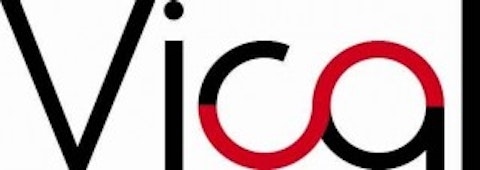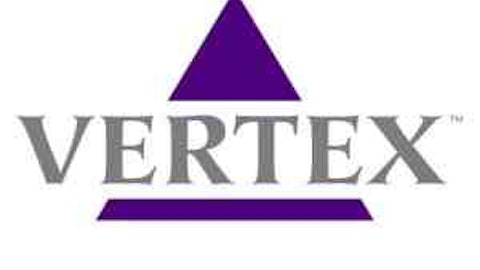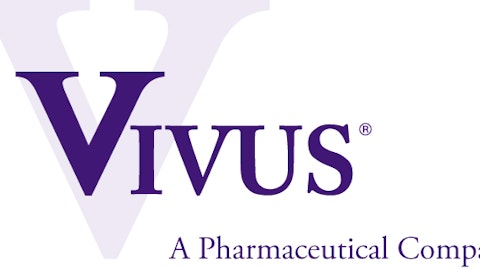Vical Incorporated (NASDAQ:VICL) announced its second-quarter results on Thursday. For the record, the biotech reported revenue of $1.5 million with a net loss of $9.9 million, or $0.11 per share. With Vical, though, these numbers aren’t very important at this stage in the game. Here are the key points from the company’s announcement that you need to know.
1. Allovectin announcement in August

Two years ago, the company stated that it would provide these results in the second quarter of 2012. When the second quarter of 2012 arrived, Vical said that the results would be announced in the latter part of the year. By November 2012, Vical had revised the time frame to the third quarter of 2013.
There were several reasons for the delays, but the pertinent fact now is that the top-line results are close at hand. Vical Incorporated (NASDAQ:VICL) CEO Vijay Samant has used the analogy of driving across the country with the destination of downtown Manhattan to describe the Allovectin phase 3 process thus far. Three months ago, he said that Vical was in Central New Jersey. Samant now says that after a detour they’re “in the city [New York City] and headed to the southern section of Manhattan.”
2. Pipeline pushing forward
It’s not all about Allovectin for Vical. The company also provided updates on a couple of drugs in its pipeline.
Vical Incorporated (NASDAQ:VICL) announced in June the initiation of a phase 3 trial of latent cytomegalovirus, or CMV, vaccine ASP0113. The biotech licensed ASP0113, formerly known as TransVax, to Astellas Pharma in 2011.
CMV is a common virus that often doesn’t show any symptoms. The study that Astellas is conducting, though, focuses on use of the ASP0113 vaccine for hematopoietic cell transplant, or HCT, patients who are at high risk for CMV. Acquiring the virus can lead to serious complications for these patients.
This phase 3 study for ASP0113 will consist of two parts. The first part will compare the overall mortality one year after transplant between patients taking the vaccine and patients on placebo. This comparison will help Astellas and Vical Incorporated (NASDAQ:VICL) determine the best primary endpoint to use for the second part of the study, which will include another 400 patients. The study is expected to be completed by the end of 2016.
Vical’s other pipeline update related to its herpes simplex virus type 2, or HSV-2, vaccine. The company plans to initiate a phase 1/2 trial for the vaccine later this year.
3. Playing the quiet game
Don’t expect to hear any news from Vical Incorporated (NASDAQ:VICL) until the Allovectin phase 3 results are announced. That’s because the company is now operating under a self-imposed quiet period. Samant noted that Vical has canceled all scheduled public presentations through the end of August.
When asked about his “final thoughts” about potential outcomes of the Allovectin study before entering the quiet period, Samant acknowledged that the vaccine needed to not only meet the primary endpoint of overall response rate but also improve survival rate — a secondary endpoint. However, he wouldn’t speculate as to by how much Allovectin needs to improve survival. As Samant said, after the results are announced “let the data speak for itself.”
Looking ahead
Anything can happen with clinical studies. Allovectin’s results could prove to be very disappointing. I suspect, though, that the overall response rate will be higher than the 11.8% seen in phase 2 because of a lower dropout rate. The big question mark relates to survival rate.
If Allovectin ultimately gains regulatory approval, the vaccine appears to be headed for tremendous success. Bristol Myers Squibb Co. (NYSE:BMY)‘s melanoma drug Yervoy generated more than $700 million in sales during 2012 — its first full year on the market. Sales during the most recent quarter jumped 44% year-over-year.
Yervoy, though, has significant side effects and must be administered via intravenous infusion. Allovectin appears to have a better safety profile. Vical’s vaccine also can be given through a conventional needle and syringe in a physician’s office.
Amgen, Inc. (NASDAQ:AMGN) stands alongside Vical in having one of the most-anticipated products for melanoma. The company reported positive response rate results from its phase 3 study of talimogene laherparepvec in March. Overall survival data won’t be available until late this year.
Even with big winners like Yervoy already on the market and decent prospects for Amgen, Inc. (NASDAQ:AMGN) to gain approval for talimogene laherparepvec, some analysts still think Vical could rack up peak annual sales in the range of $2 billion for Allovectin. If they’re even close to accurate, Vical’s market cap will become much larger than the current $380 million or so.
Everything hinges, though, on those results coming in just a few weeks. If you’re not adverse to taking risk, you could make huge gains in a short amount of time. Of course, you could also lose plenty if the results disappoint.
My view is to wait and see. If Allovectin’s response and survival rates are impressive, Vical Incorporated (NASDAQ:VICL)’s stock should keep going up for a while even after an immediate surge.
The article 3 Things You Need to Know From Vical’s Q2 Results originally appeared on Fool.com and is written by Keith Speights.
Fool contributor Keith Speights has no position in any stocks mentioned. The Motley Fool has no position in any of the stocks mentioned.
Copyright © 1995 – 2013 The Motley Fool, LLC. All rights reserved. The Motley Fool has a disclosure policy.




